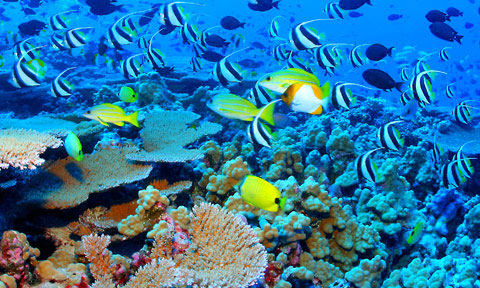'Bombs slow' in the seabed
The acidification of the oceans is a "slow explosive bomb" located in the sea, seriously threatening the lives of marine species and communities living in coastal areas, a new report says. This is a warning from Natural England (England).

Ocean shimmering.
According to the latest scientific research data, the concentration of acid in the oceans has increased by a third compared to before the industrial revolution in the world. The cause of increased acidity is because too much CO2 is released into the air.
Scientists are concerned that if the greenhouse gas emissions continue to rise at the current rate, seawater acid levels will increase by 120% by 2060 - the highest level in 21 million years. Earth history.
If this concern becomes a reality, a large number of plants and animals in the oceans will be seriously affected. The number of aquatic species will be significantly reduced due to the high acidity, which reduces their fertility. This will directly affect the economics of coastal communities, especially poor countries because their lives depend mainly on fishing.
Acidification of oceans is also one of the most important issues discussed by world leaders at the UN-organized climate change summit taking place in Copenhagen's Capital. Circuit.
Dr. Helen Phillips, Director of Natural England, said that if you want the marine ecosystem to not be broken by acidification, the most important thing is that we must keep the greenhouse gas below the allowable level. .
'The amount of CO2 released into the atmosphere directly affects the acidity of our oceans , ' said Dr. Helen. 'The rise of sea acid levels is seriously threatening the marine environment - this is a huge challenge for the world and it requires urgent action to protect the marine ecosystem. '
- What is a thermo-weapon?
- The terrible truth about the damage of nail bombs
- Differences between atomic bombs and fusion
- American bizarre bombs only kill people, do not destroy houses
- Japan used to build bombs flying across the ocean
- What will happen if all the nuclear bombs in the world fire at the same time?
- Put the hair on the back of the Russian 'Father of Bombs' power
- Canada started drawing seabed maps around the North Pole
- Why does the mother of bombs explode in the air instead of underground?
- To destroy the world, only 10 fusion bombs are needed
- American 'mother' is not as strong as the Russian 'father bomb'?
- Scientists spread bacteria onto Nazi bombs submerged under the sea
 Surprised: Fish that live in the dark ocean still see colors
Surprised: Fish that live in the dark ocean still see colors Japan suddenly caught the creature that caused the earthquake in the legend
Japan suddenly caught the creature that caused the earthquake in the legend A series of gray whale carcasses washed ashore on California's coast
A series of gray whale carcasses washed ashore on California's coast Compare the size of shark species in the world
Compare the size of shark species in the world